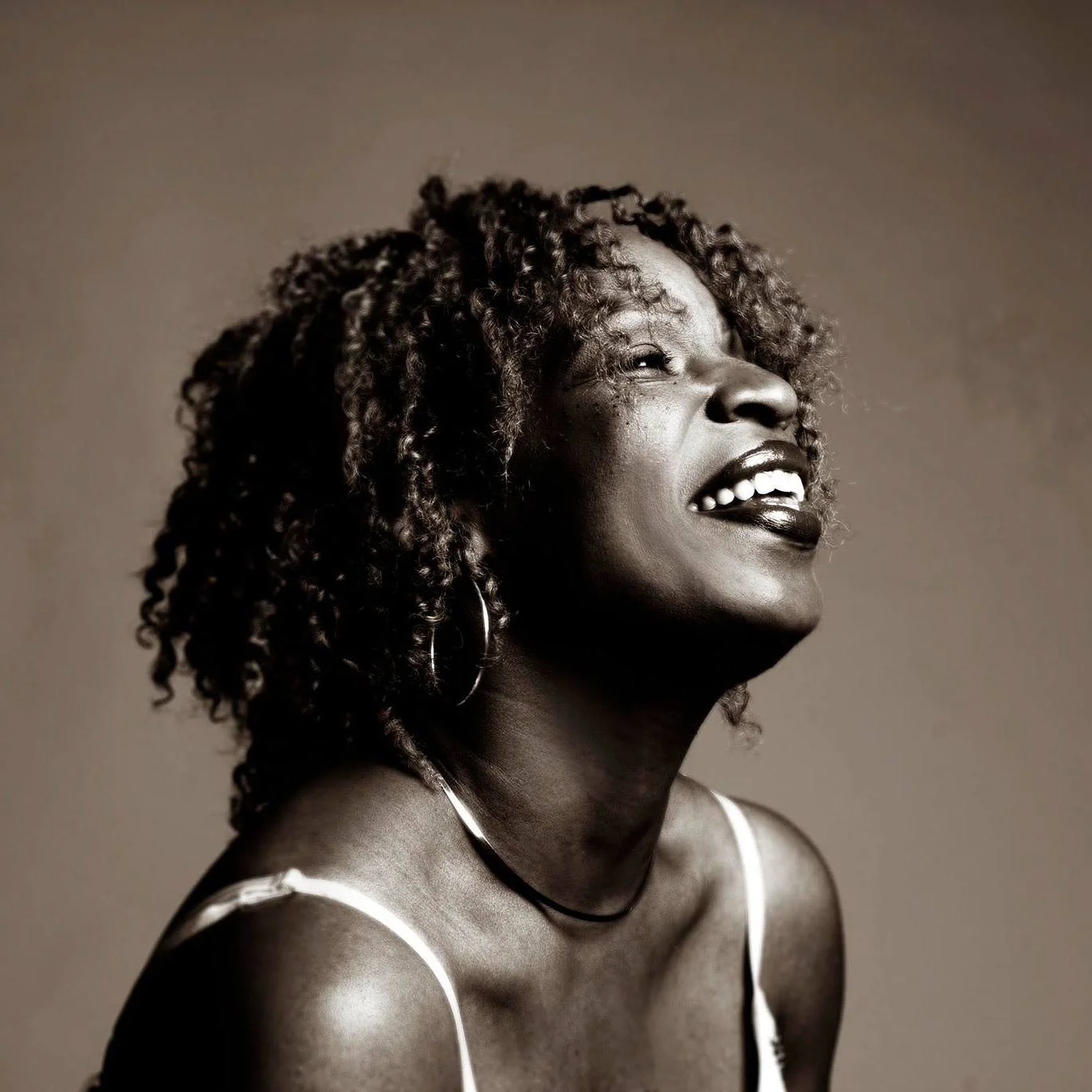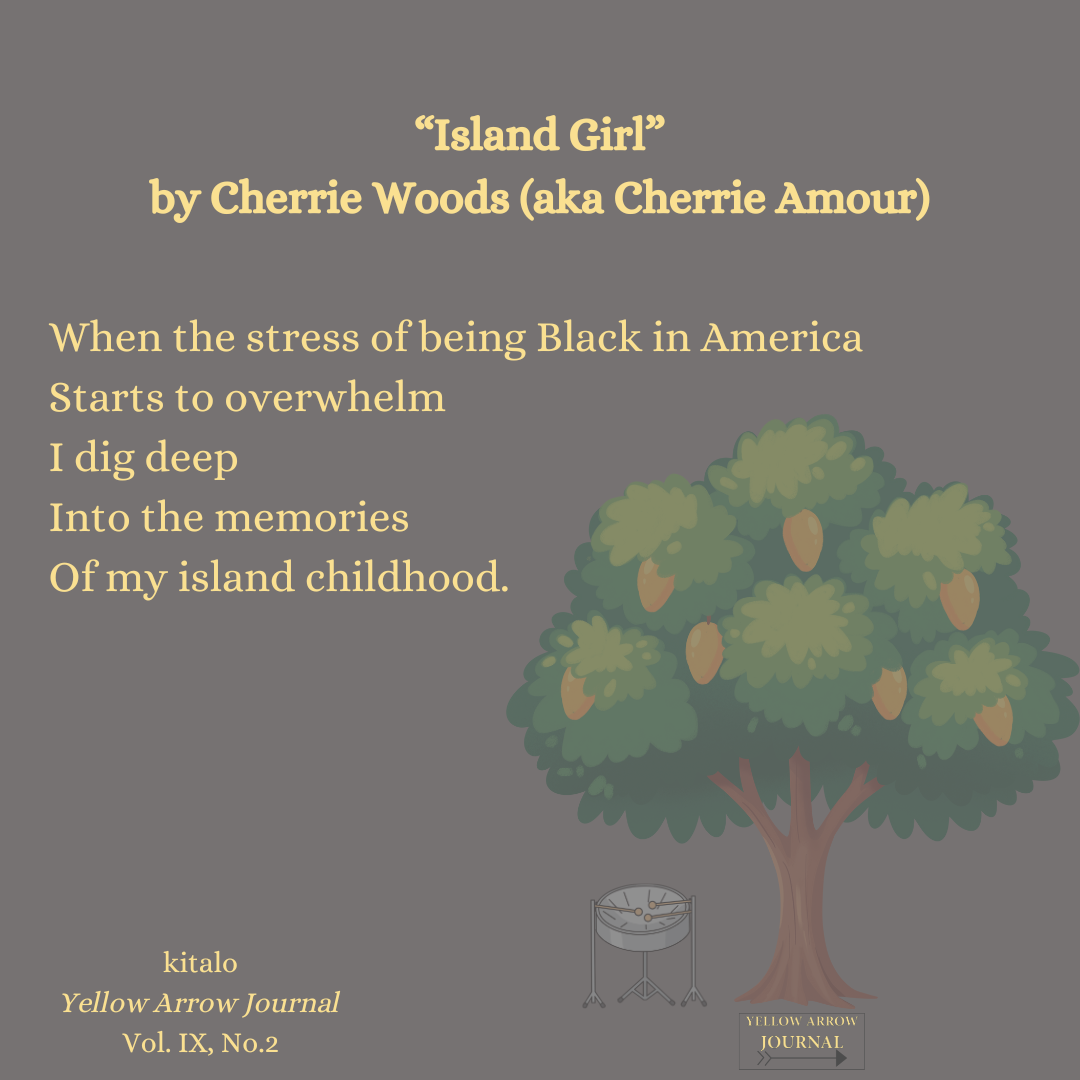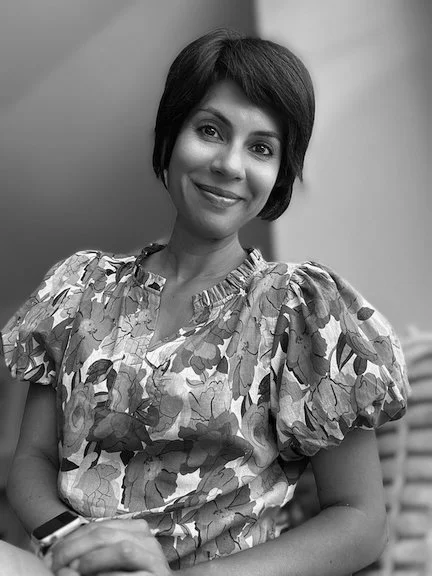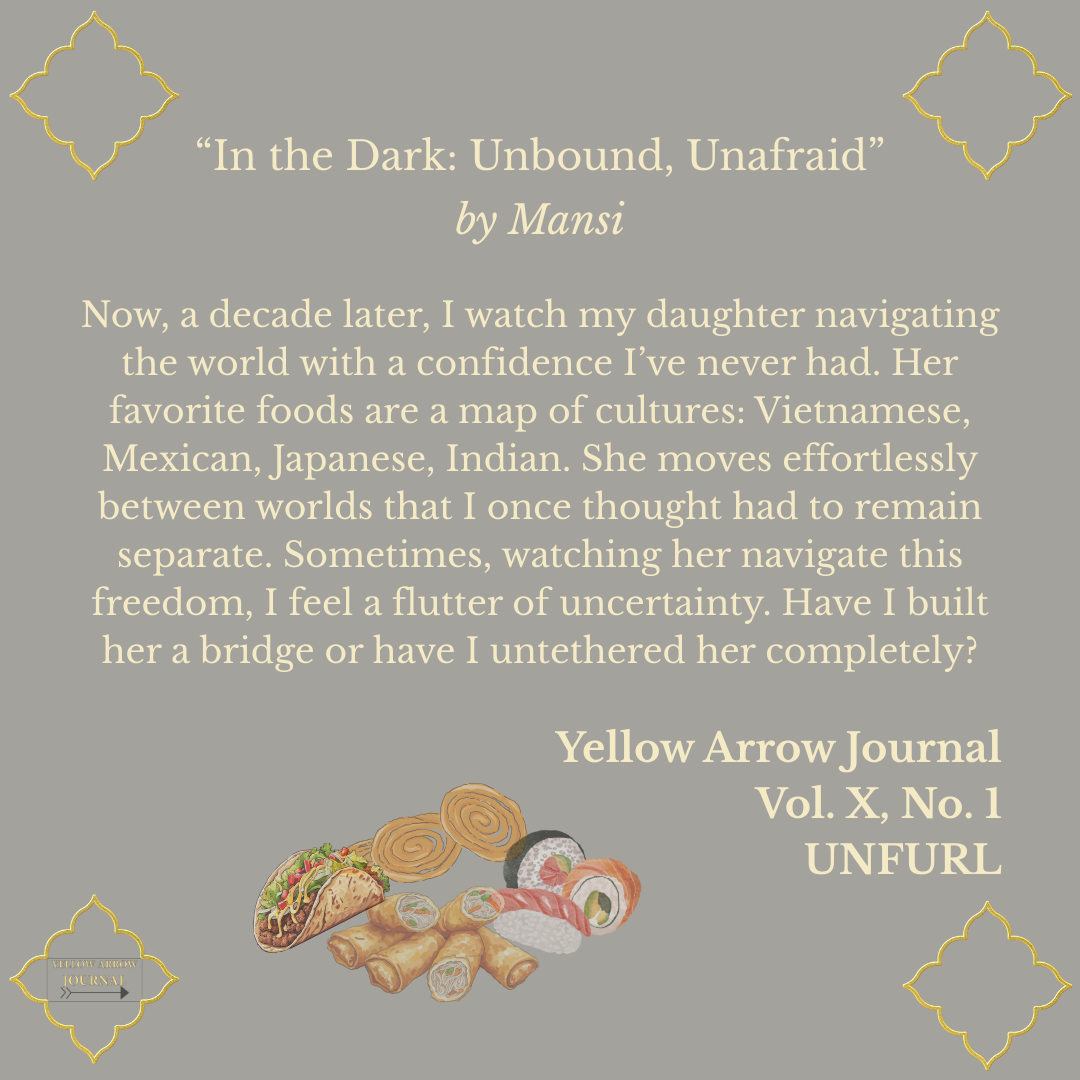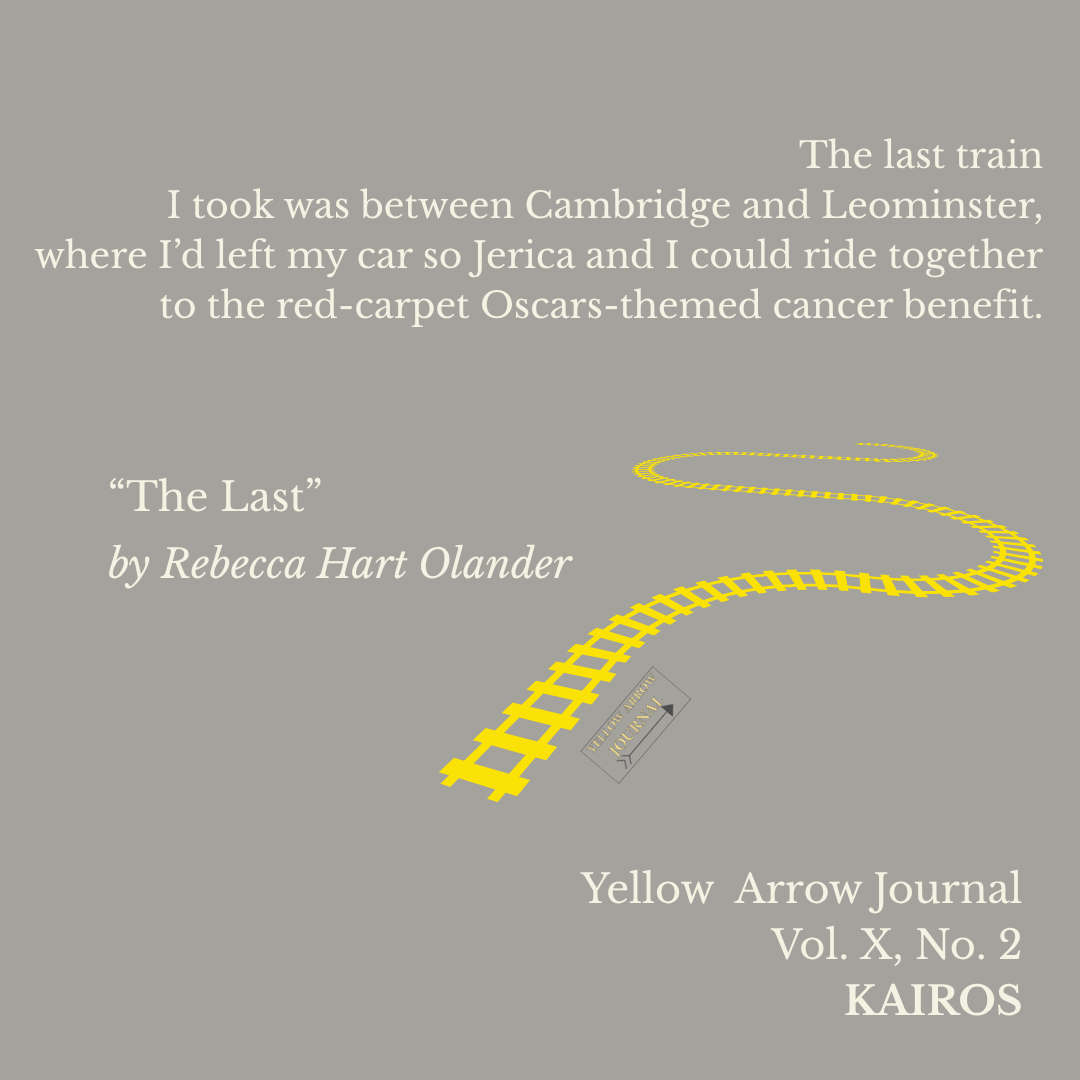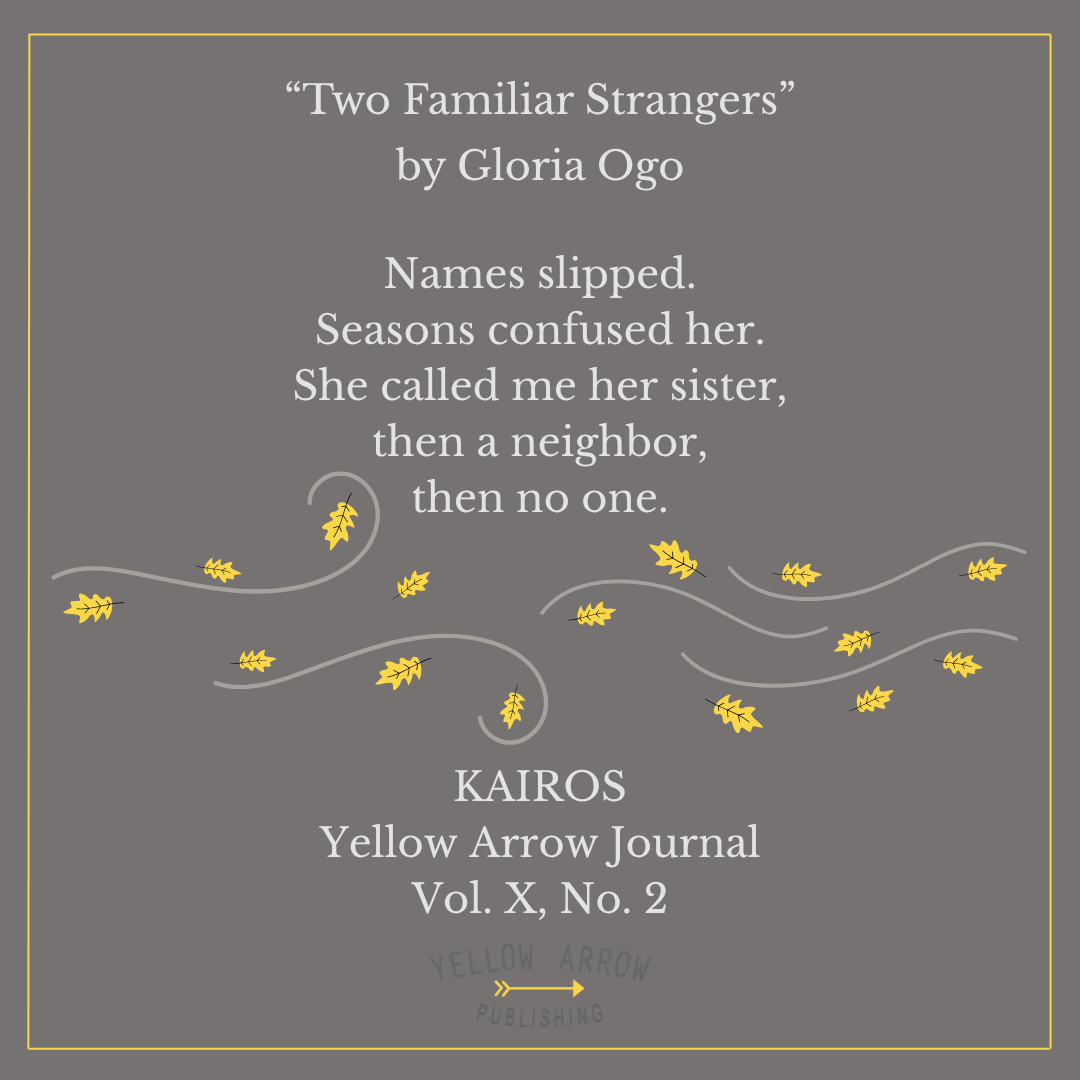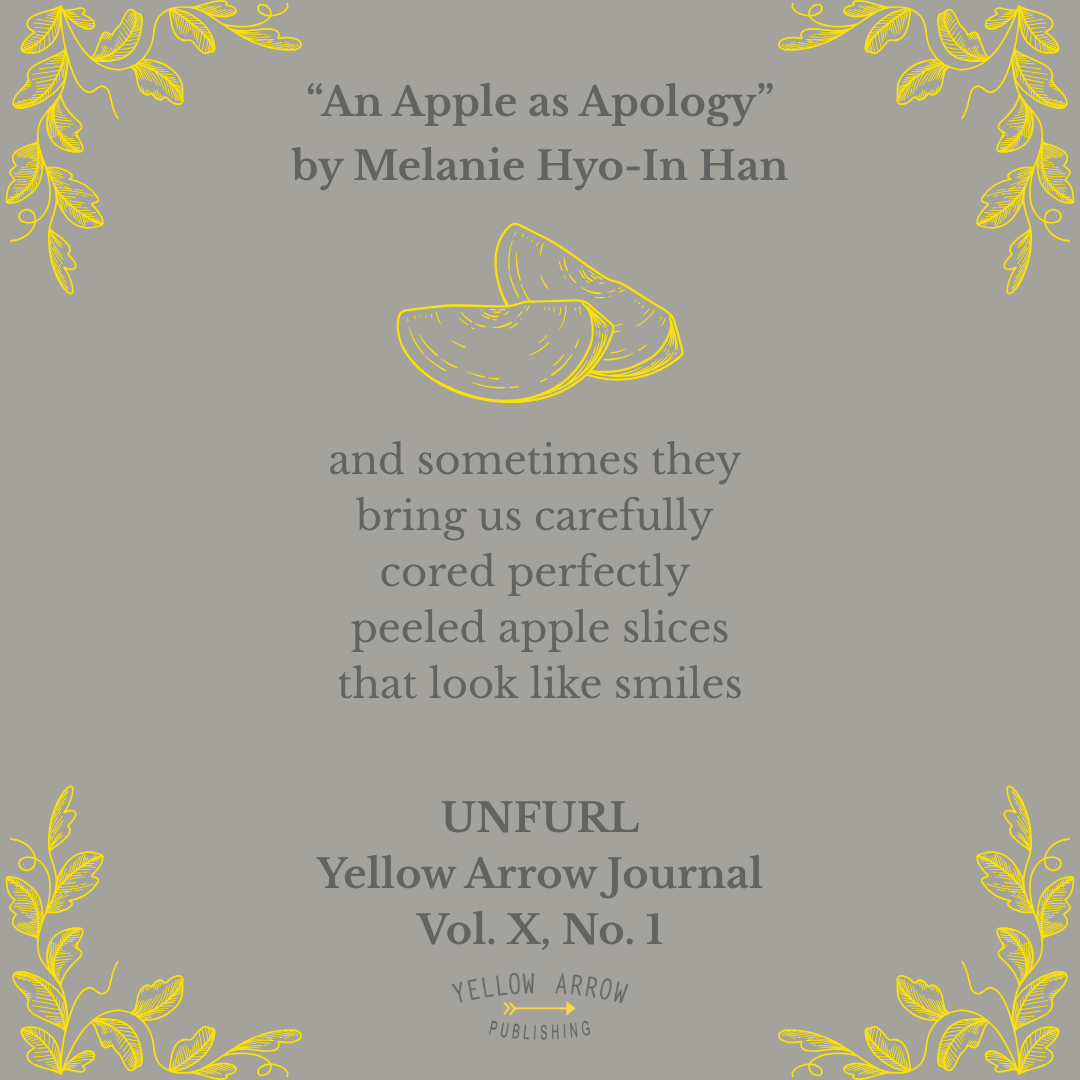
.WRITERS.ON.WRITING..Writers.on.Writing.
Get to know our authors, the foundation and heart of Yellow Arrow Journal, and what writing means to them through our monthly series.
.W.o.W. #81
Cherrie Woods (aka Cherrie Amour)
Describe an early experience where you learned that language has power.
It was in Toronto in the late ‘90s when a local poet, Dwayne Morgan, began to blow up as a poet with his Black conscious poetry. It was my first experience seeing a local poet become a celebrity.
What is a book you wish someone would write? That you want to write (or are writing).
A memoir about a double-woman immigrant from the Caribbean who fits in on the outside but feels awkward in two different countries—one that includes the pain and humor of not truly fitting in. Think of a book that combines Chimamanda Ngozi Adichie’s Americanah with Issa Rae’s Misadventures of Awkward Black Girl.
What does your inner writing voice tell you?
To keep working at my writing and take chances by submitting more.
What book is on the top of your to-be-read pile?
What Have We Here? by Billy Dee Williams (I met him at the Pratt Library after a lifetime of adoration).
Cherrie Woods (aka Cherrie Amour) is a Baltimore-based award-winning poet whose candid, narrative style is shared in her book, Free to Be Me: Poems on Love, Life, and Relationships. Her poems have been published in the Paterson Literary Review, Understorey Magazine, Poet’s Ink, The Fire Inside: Collected Poems and Stories from Zora’s Den, The Pen Woman, Maryland in Poetry, and America’s Future: Poetry & Prose in Response to Tomorrow. She is currently seeking publication for her new poetry manuscript, Sit Comfortably Elsewhere.
Yellow Arrow published Cherrie’s “Island Girl” in Yellow Arrow Journal kitalo, Vol. IX, No. 2, fall 2024 and “Kid Bamboo” in Yellow Arrow Vignette AMPLIFY. You can find Cherrie online at cherrieamour.com and on Instagram @cherrie_amour_thepoet and @cherriewoods and Facebook @cherrie.amour and @cherrie.woods.
Cherrie is teaching a virtual workshop at the Baltimore County Public Library called “Public Relations for Authors with Cherrie Woods” on February 10 (Tuesday) from 7:00 p.m. to 8:30 p.m. Learn more and register at events.bcpl.info/event/15509927.
.Writers.on.Writing.
Get to know our authors, the foundation and heart of Yellow Arrow Journal, and what writing means to them through our monthly series.
.W.o.W. #80
Mansi Bhatia
Why did you submit your piece to Yellow Arrow Journal? Why this piece at this time?
This piece emerged from a season of deep introspection—a reckoning with old narratives, inherited silences, and the ways we unbind ourselves from the past. “In the Dark: Unbound, Unafraid” is about stepping into one’s own light after years of living in the shadows of cultural expectations. For me this essay felt like shedding the weight of inherited trauma while making space for a new way of being—for both myself and my daughter. I submitted it to Yellow Arrow Journal because UNFURL is a perfect match for this essay’s exploration of transformation, inheritance, and the intentional unmaking of outdated narratives. This piece speaks to the unique journeys women take when reclaiming themselves from cultural, familial, and societal conditioning. It aligns with the journal’s mission to amplify underrepresented voices—particularly those navigating complex cultural and generational identities. We are in a moment where motherhood, identity, and autonomy are at the forefront of cultural conversations. Whether in discussions about reproductive rights, intergenerational trauma, or the shifting expectations of women across cultures, this piece speaks to a collective reckoning—one that asks:
What do we carry forward and what do we leave behind?
How do we unfurl into our truest selves while honoring where we came from?
How do we rewrite the stories we inherit without erasing them entirely?
This piece isn’t just personal—it’s a reflection of a larger, urgent conversation about women’s agency, lineage, and self-definition. It’s about choosing to mother differently, live differently, and tell new stories that make space for freedom.
What period of your life do you find you write about most often?
I return to the in-between spaces—adolescence, early motherhood, moments of transition. The times when identity is fluid, when belonging, feels both urgent and unattainable. The times when everything felt like it might break apart but somehow held together. These are the periods that shaped me, and I find myself revisiting them in different ways, through different lenses, in nearly everything I write.
What does your inner writing voice tell you?
To let the words fall out, without self-censorship or judgment; to embrace the ugliness and the broken parts just as much as the beauty.
What book is on the top of your to-be-read pile?
Making Time: A New Vision for Crafting a Life Beyond Productivity by Maria Bowler.
Mansi Bhatia (Mansi) is a writer and creativity facilitator exploring themes of identity, human connection, and the ripple effects of kindness. Her work examines the complexities of motherhood, cultural boundaries, and personal transformation. She is currently writing a book on the intersection of art, storytelling, and everyday generosity, forthcoming from Schiffer Craft in Spring 2027. Through her work, she encourages others to embrace creativity as an act of self-trust and presence. She lives in California with her family.
An essay, “The Field Between Us” was nominated for a Pushcart Prize by Chicago Story Press. Mansi also has two essays forthcoming: “An Unwanted Inheritance: A Fractured Love,” which will be published by Pangyrus Literary Magazine, and “Easier to Let You Win,” which will be published by ManifestStation.
Yellow Arrow published Mansi’s essay “In the Dark: Unbound, Unafraid in Yellow Arrow Journal UNFURL, Vol. X, No. 1, Spring 2025. You can find Mansi at littletokensbigripples.com or on Instagram @littletokensbigripples.
.Writers.on.Writing.
Get to know our authors, the foundation and heart of Yellow Arrow Journal, and what writing means to them through our monthly series.
.W.o.W. #79
Rebecca Hart Olander
Why did you submit this piece to Yellow Arrow Journal? Why this piece at this time?
My poem “The Last” is for my dear friend Jerica, who died in 2020 of breast cancer. My second full-length collection, Singing from the Deep End, has a center section of poems written in honor of Jerica and our friendship. The book will be published in February 2026, so I had a small window in which to send unpublished poems from the book into the world. Yellow Arrow Publishing, with its focus on uplifting the work of women, is a journal I’ve admired and felt like the perfect home for a Jerica poem. Friendship with Jerica altered me, as did her passing. She shaped me, and the path I walk on is forever bordered by both her presence and absence, so the theme of KAIROS felt apt. I’m grateful the editors agreed!
Describe an early experience where you learned that language has power.
This question makes me think of the power of books and the magical way we get lost in them as young readers. Being transported as a reader is something I miss having as much as I once did, and I love those rare moments when I can reclaim that feeling. But I also think of my mother as storyteller, my stepmother as poet, and of music, the soundtrack of my childhood. Then there is the inverse power, the inability to put language to something, to name it, or being made to keep something silent. Or using language to judge. That whole “names can never hurt me” chant never rang true for me.
What does your inner writing voice tell you?
I don’t think I know! I’m so used to training myself not to listen, as in to reject the inner editor, that I’m not sure I’m listening to her! Hmm. . . Much of my work stems from childhood, so I guess she is my memory, and she’s telling me to remember, or what details to unearth and share.
If you could tell your younger writing self anything, what would it be?
Be patient, but also, go looking for the sparks! As for patience, my first full-length collection, Uncertain Acrobats, was published the month I turned 50, in November 2021, and I had sent it out about 60 times before it was accepted. Also, I haven’t always practiced writing on a regular schedule, but I have been steadfast in my attention to poetry over time. Regarding the sparks, I used to think some muse had to hit me over the head to grace me with an idea. Now I know it’s necessary to, as Emily Dickinson famously said in a letter, go “out with lanterns, looking for myself.” For me this means engaging in poetry community, spending time inartistic spaces or in nature, responding to prompts to get myself generating, and reading the work of others.
Rebecca Hart Olander is a Women’s National Book Association Poetry Award winner and the author of three poetry collections: Dressing the Wounds (dancing girl press, 2019), Uncertain Acrobats (CavanKerry Press, 2021), a finalist for the Eric Hoffer Book Award in Poetry and the Massachusetts Book Award in Poetry, and Singing from the Deep End (CavanKerry Press, 2026). Rebecca has taught writing at Amherst and Smith colleges, Westfield State University, and Pioneer Valley Writers’ Workshop, and she works with poets in the Maslow Family Graduate Program in Creative Writing. She is the editor/director of Perugia Press.
Rebecca’s poem “The Last” was included in Yellow Arrow Journal KAIROS, Vol. X, No. 2, Fall 2025. You can find her at rebeccahartolander.com, on Instagram @rholanderpoet, or on Facebook.
.Writers.on.Writing.
Get to know our authors, the foundation and heart of Yellow Arrow Journal, and what writing means to them through our monthly series.
.W.o.W. #78
Gloria Ogo
How did you first publish your writing and what was it?
My first published work is the novel While Men Slept. It was published in Nigeria and approved by the national education board for use in Nigerian universities, colleges of education, and high schools. Since then, I have never stopped writing.
Describe an early experience where you learned that language has power.
When I was in elementary school I remember standing in front of my classmates during a reading exercise. I had always been quiet, the kind of child who preferred observing to speaking, but that day I read aloud a short story I had written. The room grew unexpectedly still. The fact that words I had strung together could hold the attention of 30 restless children stunned me. Afterward, a teacher told me, “Your voice paints pictures,” and I realized that language could move people, not just carry information. It could silence noise, create images, even shift the way others looked at me. That moment taught me that language is not neutral, it has weight, rhythm, and power to shape how we are seen and how we see the world.
What is essential for good storytelling? What types of stories do you find yourself driving inspiration from and how do they manifest in your work?
For me, good storytelling requires honesty, tension, and resonance. A story must feel true on an emotional level even if it unfolds in imagined worlds. I believe what’s essential is the balance between voice, structure, and the deeper pulse of human experience; something that lingers beyond the page. I often draw inspiration from stories that sit at the intersection of reality and the surreal: folktales, speculative fiction, and narratives rooted in history but reimagined through myth or memory. I’m especially drawn to stories that carry the weight of displacement, identity, and transformation because they mirror the complexities of lived experience while also offering a way to dream beyond it. These influences manifest in my work through layered characters, blurred boundaries between the real and the unreal, and imagery that bends the ordinary into something luminous or unsettling.
What does your inner writing voice tell you?
Keep going. You will get there.
Gloria Ogo is an American-based Nigerian writer with several published novels and poetry collections. Her work has appeared in Eye to the Telescope, Brittle Paper, Spillwords Press, Metastellar, CON-SCIO Magazine, Kaleidoscope, The Easterner, Daily Trust, and more. With an MFA in creative writing, Gloria was a reader for Barely South Review. She is the winner of the Brigitte Poirson 2024 Literature Prize and a finalist for the Jerri Dickseski Fiction Prize 2024 and ODU 2025 Poetry Prize, both with honorable mentions. Her work was also longlisted for the 2025 American Short(er) Fiction Prize.
Yellow Arrow published Gloria’s piece “Two Familiar Strangers” as the foreword to Yellow Arrow Journal, Vol. X, No. 2, KAIROS. You can find her online on Facebook @gloria.ekedum and at glriaogo.wixsite.com/gloria-ogo.
.Writers.on.Writing.
Get to know our authors, the foundation and heart of Yellow Arrow Journal, and what writing means to them through our monthly series.
.W.o.W. #77
Melanie Hyo-In Han
What does your inner writing voice tell you?
Write so others who feel isolated can find a sense of home and belonging.
Describe an early experience where you learned that language has power.
I grew up in East Africa where I spoke Korean at home and Swahili in the community. When I was five years old, I started learning English for the first time at school and became frustrated by the fact that I couldn’t communicate effectively. I wanted to play with my classmates but could only point at things or smile, and that’s the first time I realized how much power language has. As a kid, I obviously picked English up really quickly, but it wasn’t until I was much older that there was a lot of resentment I’d felt not being able to express myself and then the eventual freedom that came with being able to talk to others.
What word do you find yourself using most often in your writing?
Probably the word “home” since, in my writing, it’s sometimes a tangible place, but most often, it’s a feeling or an abstract location that I seek to explore.
How did you last publish your writing (before Yellow Arrow) and what was it?
It was a chapbook of nature-related poetry titled Abecedarian: Banff, Canada by kith books. I was invited to participate in a writing residency last summer at Banff Centre for Arts in Creativity, and though nature poetry isn’t my usual forte, I was so inspired by the beauty of Banff that I decided to write some poems about the flora and fauna of the national park. I sent the chapbook manuscript out to several publishers and was lucky enough to have it picked up by kith books, and it was released just this past March, which is very exciting!
Born in Korea and raised in East Africa, Melanie Hyo-In Han recently moved from the U.S. to the U.K. She is the author of Abecedarian: Banff, Canada (kith books), My Dear Yeast (Milk & Cake Press), and Sandpaper Tongue, Parchment Lips (Finishing Line Press), as well as the translator of several collections of Spanish poetry (Hebel Ediciones). Melanie has been awarded fellowships from Gladstone’s Library, The Society of Authors, Sundress Academy, Banff Centre, and Casa Uno. She is the Coeditor-in-Chief of Flora Fiction and the Two Languages Prize Editor at Gasher Press.
Yellow Arrow published Melanie’s piece “An Apple as Apology” in Yellow Arrow Journal, Vol. X, No. 1, UNFURL. You can find her online on Instagram @melhan and at melaniehan.com.
Recently, Melanie published a chapbook with boats against the current entitled Passing Notes in Secret. We absolutely enjoyed reading the chapbook; make sure to get your copy at boatsagainstthecurrent.org. Congratulations Melanie!
